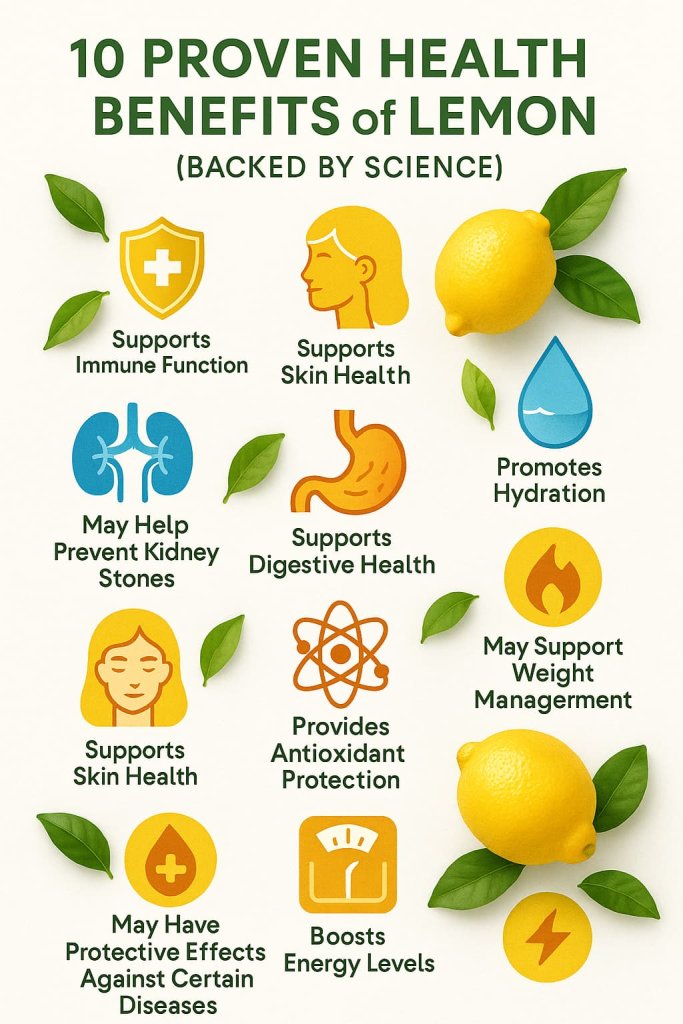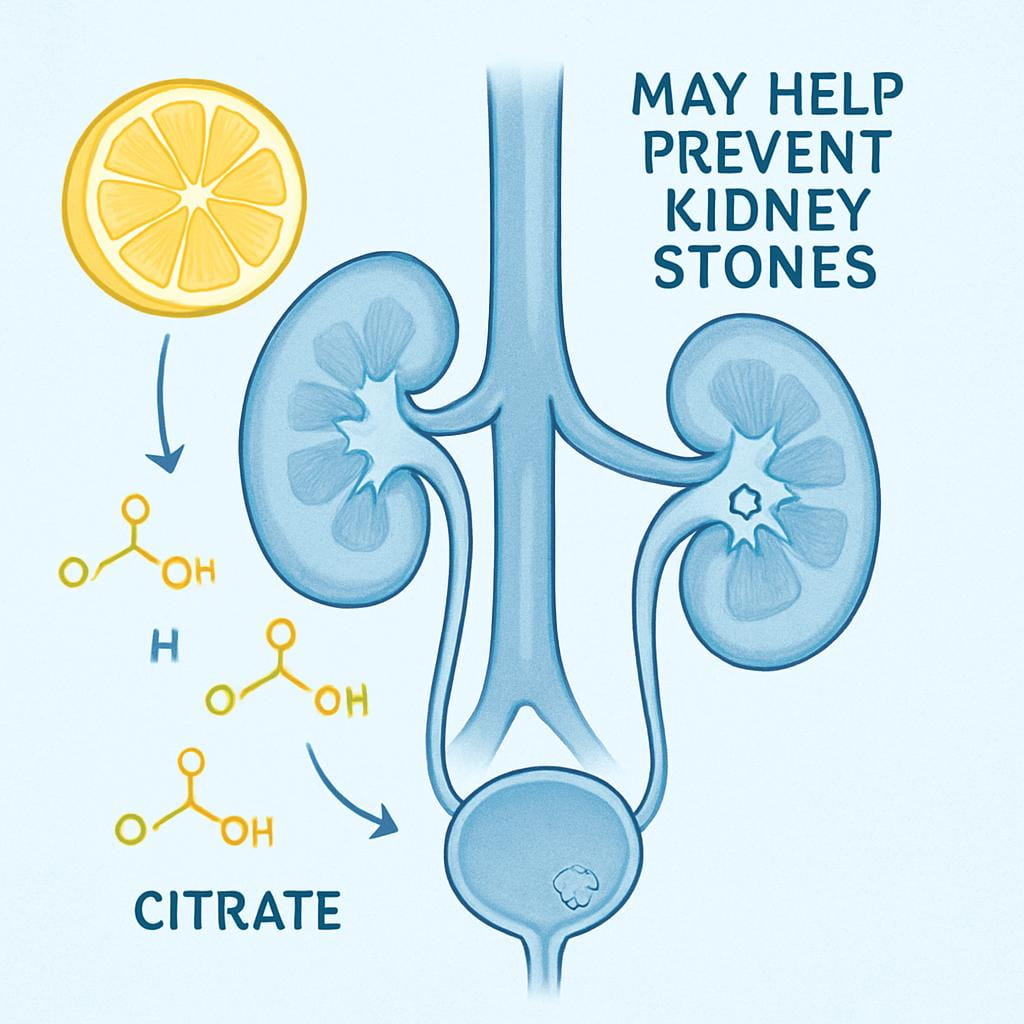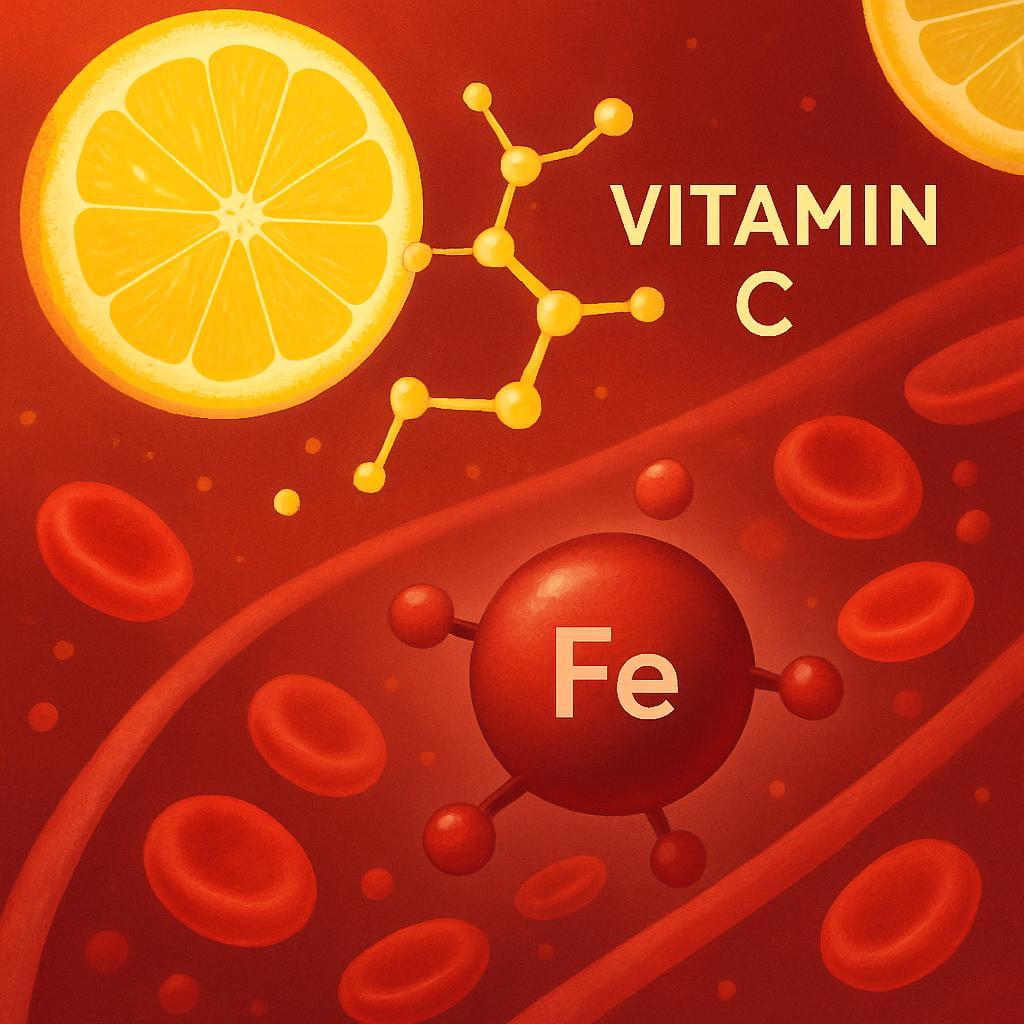Lemon is rich in vitamin C, antioxidants, and plant compounds that may help support immunity, heart health, skin vitality, and digestive wellness.
This citrus fruit has been used worldwide for centuries, not as a cure, but as a natural source of essential nutrients that support the body’s overall wellness. Understanding lemon’s scientifically supported benefits can help you include it wisely in your daily diet for hydration, energy, and vitality.

What Is Lemon?
Lemon (Citrus limon) is a vibrant yellow citrus fruit from the Rutaceae family, cultivated worldwide for its culinary, nutritional, and wellness value. It is naturally rich in vitamin C, citric acid, and flavonoids such as eriocitrin, hesperidin, and naringin, which contribute to its antioxidant and metabolic-supporting properties.
According to Frontiers in Nutrition (2022), citrus flavonoids exhibit strong antioxidant activity and may help regulate inflammation and gut microbiota balance. The vitamin C in lemon supports immune defense and collagen synthesis, while citric acid may aid mineral absorption and urinary health. Globally, lemons are widely used in foods, beverages, and wellness routines to promote hydration and overall vitality as part of a balanced diet.

Nutritional Profile of Lemon (Per 100 g)
Lemon is a low-calorie, nutrient-dense fruit that provides essential vitamins, minerals, and beneficial plant compounds. According to the USDA FoodData Central (2024), fresh raw lemon delivers high levels of vitamin C, moderate potassium, and a small amount of dietary fiber, making it an excellent addition to a balanced diet.
| Nutrient | Amount (per 100 g) | % Daily Value (approx.) |
|---|---|---|
| Calories | 29 kcal | — |
| Water | 89 g | — |
| Carbohydrates | 9.3 g | — |
| Dietary Fiber | 2.8 g | 10 % |
| Sugars | 2.5 g | — |
| Protein | 1.1 g | — |
| Fat | 0.3 g | — |
| Vitamin C | 53 mg | 59 % |
| Potassium | 138 mg | 3 % |
| Folate | 11 µg | 3 % |
| Citric Acid | ≈ 4.5 – 5 g | — |
Beyond these nutrients, lemons contain bioactive phytochemicals such as hesperidin, eriocitrin, and limonene, which act as natural antioxidants. These compounds may support metabolic balance, cellular protection, and gut health when consumed regularly as part of a varied diet.
Studies published in Frontiers in Nutrition (2022) highlight that citrus flavonoids help modulate oxidative stress and inflammation, reinforcing lemon’s role as a functional food for wellness.
10 Proven Health Benefits of Lemon (Backed by Science)
Lemons are a powerhouse of vitamin C, antioxidants, and plant-based compounds that support multiple aspects of health and well-being.
Here are ten science-backed ways this citrus fruit may help you stay nourished, hydrated, and energized.
1. Supports Immune Function

Lemons are one of the richest natural sources of vitamin C, a nutrient vital for immune defense and antioxidant protection.
According to the National Institutes of Health (NIH) Office of Dietary Supplements, vitamin C supports the immune system by stimulating white-blood-cell production and enhancing the skin’s barrier function.
Regular intake of lemon juice or water with fresh lemon may help the body respond more efficiently to everyday environmental stressors and shorten the duration of minor colds, as shown in several clinical reviews.
2. Promotes Heart Health

The vitamin C, soluble fiber, and flavonoids found in lemons — including hesperidin and diosmin — may help maintain healthy blood vessels and overall cardiovascular wellness.
Research published in the American Journal of Clinical Nutrition and summarized by the Harvard T.H. Chan School of Public Health notes that higher citrus fruit intake is linked with a lower risk of ischemic stroke and hypertension.
Additionally, a Japanese cohort study reported that women who consumed lemon daily and walked regularly experienced a meaningful reduction in systolic blood pressure (PMC 4003767).
These findings suggest that combining lemon consumption with an active lifestyle supports long-term heart function.
3. May Help Prevent Kidney Stones

Lemons are rich in citric acid, a natural compound that may help prevent the formation of certain types of kidney stones — particularly calcium oxalate stones. Citric acid binds with calcium in the urine, reducing the likelihood of crystal formation and helping the body flush out minerals more efficiently.
According to the National Kidney Foundation, consuming natural sources of citrate — such as lemon or lime juice — can help increase urinary citrate levels and create an environment less favorable for stone development. Similarly, UT Southwestern Medical Center notes that drinking lemon water throughout the day supports optimal hydration, dilutes urine, and may lower the risk of kidney stone recurrence.
Replacing sugary or artificially sweetened beverages with fresh lemon water is a simple, evidence-based way to promote urinary-tract health and support balanced mineral excretion — contributing to overall kidney wellness.
4. Supports Digestive Health

Lemon juice naturally stimulates gastric acid and bile secretion, which helps break down food and improve nutrient absorption.
Its pectin-rich pulp provides prebiotic fiber that can nourish beneficial gut bacteria and promote regularity.
According to the Cleveland Clinic, drinking warm lemon water in the morning may gently awaken the digestive system and support hydration before meals.
Including lemon in your diet can be an easy step toward a healthier gut environment.
5. Aids Iron Absorption

Plant-based (non-heme) iron from foods such as lentils, spinach, and beans is less readily absorbed by the body.
However, vitamin C and citric acid in lemons can significantly improve iron bioavailability when consumed together.
Harvard Health Publishing highlights that pairing iron-rich foods with vitamin C sources — such as a squeeze of lemon — can dramatically enhance absorption and help prevent deficiencies, particularly in vegetarian or vegan diets.
6. Provides Antioxidant Protection

Lemons contain flavonoids, polyphenols, and vitamin C, which collectively defend cells from oxidative stress — a major contributor to aging and chronic inflammation.
A review in Frontiers in Nutrition (2023) found that citrus polyphenols help maintain antioxidant enzyme balance and modulate inflammatory pathways, supporting long-term cellular health.
Incorporating lemon juice or zest into meals can provide a simple, daily source of natural antioxidant support.
7. Supports Skin Health and Collagen Formation

Vitamin C is essential for the synthesis of collagen, the structural protein that maintains skin elasticity and firmness.
The American Academy of Dermatology notes that adequate vitamin C intake supports skin repair and protection from UV-related oxidative damage.
Regularly consuming vitamin C-rich foods like lemons may help promote smoother, brighter skin and support wound recovery when paired with a nutrient-dense diet and sunscreen use.
8. Promotes Hydration and Electrolyte Balance

Adding lemon slices or a squeeze of fresh lemon juice to water enhances its flavor and encourages consistent hydration — a vital factor for maintaining energy, focus, and healthy body function. Hydration plays a critical role in nutrient transport, temperature regulation, and digestion.
The Mayo Clinic emphasizes that adequate water intake supports every system in the body — including the heart, brain, and muscles — by helping regulate temperature, remove waste, and lubricate joints. Proper hydration also helps prevent fatigue and supports optimal organ performance.
Lemons naturally contain potassium, an essential electrolyte that helps maintain fluid balance, muscle contraction, and nerve signaling. Combining lemon with water not only adds refreshing flavor but also contributes trace electrolytes that support overall hydration and daily wellness.
9. May Support Weight Management

Lemons can be part of a balanced weight-management plan due to their low calorie and high fiber content.
Pectin fiber in the pulp may expand slightly in the stomach, helping you feel full for longer.
According to Healthline, swapping sugary beverages for lemon water can reduce overall calorie intake and support healthier hydration habits — small changes that add up to better weight control over time.
10. May Have Protective Effects Against Certain Diseases
Emerging research suggests that citrus flavonoids such as hesperidin and eriocitrin may support metabolic health by improving lipid metabolism, reducing oxidative stress, and aiding glucose regulation.
A 2022 analysis in the Journal of Nutritional Science noted that these bioactive compounds show potential in promoting cardiometabolic balance, though more human trials are needed to confirm clinical outcomes.
Consuming lemons as part of a diverse diet rich in fruits and vegetables may help protect against metabolic dysfunction over the long term.
How to Include Lemon in Your Diet

Lemons are versatile and easy to incorporate into your daily meals and beverages. Adding them to your diet can naturally enhance flavor and nutrient absorption.
Practical ways to use lemon:
- Warm lemon water: Squeeze ½ a lemon into a cup of warm water in the morning to support hydration and digestion.
- Fresh juice: Add lemon juice to smoothies, detox waters, or herbal teas for a vitamin C boost.
- Salads and dressings: Combine lemon juice with olive oil and herbs for a light, antioxidant-rich dressing.
- Cooking: Use lemon zest and juice to flavor seafood, chicken, lentils, or steamed vegetables.
- Infusions: Add slices of lemon to green or herbal tea for aroma and added antioxidants.
Safe serving guidance: Consume about ½–1 medium lemon (≈ 25–50 ml juice) per day, preferably diluted in water or mixed with food to protect tooth enamel. Pairing lemon with iron-rich plant foods like spinach, lentils, or beans enhances iron absorption naturally.
Possible Side Effects and Precautions
While lemons are generally recognized as safe and beneficial, mindful consumption is important to avoid potential sensitivities or side effects. Moderation ensures you enjoy their health benefits without discomfort or irritation.
| Concern | Description | Safe Guidance |
|---|---|---|
| Tooth enamel erosion | Lemon juice is naturally acidic and may weaken tooth enamel with frequent undiluted use. | Always dilute lemon juice in water and rinse your mouth afterward to protect enamel. |
| Acid reflux or heartburn | The citric acid in lemons may trigger reflux or burning sensations in sensitive individuals. | Avoid consuming lemon juice on an empty stomach and limit intake if symptoms occur. |
| Allergic reactions | Rarely, citrus fruits can cause mild itching or oral irritation. | Stop consumption and consult a healthcare provider if any allergic response occurs. |
According to the American Pregnancy Association, lemons are generally safe for pregnant women when consumed in food amounts. Their vitamin C content supports maternal and fetal nutrition, but excessive intake of acidic beverages may worsen heartburn — a common symptom during pregnancy.
Always consume lemons in moderation and avoid extreme “lemon detox” regimens or high-acid cleanses that may upset digestive balance. When used wisely, lemons can safely support hydration, immunity, and overall wellness as part of a nutrient-rich diet.
Recommended Storage and Food Safety Tips
Proper storage preserves lemon’s freshness, flavor, and nutrient quality while preventing bacterial contamination.
The U.S. Food and Drug Administration (FDA) recommends safe handling practices for fruits and produce.
Storage guidelines:
- Keep whole lemons in the refrigerator at ≤ 40 °F (4 °C) for up to 3–4 weeks.
- Store cut lemons in airtight glass containers and use within 3 days.
- Rinse lemons thoroughly under running water before slicing to remove dirt and residues.
- Avoid direct sunlight or humid storage, which can cause mold growth.
Long-term tip: Lemon slices can be frozen or juiced and stored in ice cube trays for later use — perfect for quick infusions or cooking.
Frequently Asked Questions (FAQ)
1. Is drinking lemon water daily safe?
Yes, lemon water is safe for most people when diluted properly. One or two glasses a day can support hydration and vitamin C intake.
2. Does lemon make the body alkaline?
While lemon juice is acidic, it produces alkaline byproducts after digestion, which may help maintain balanced body pH.
3. Can lemon help improve skin appearance?
Lemon’s vitamin C supports collagen production and protects against oxidative damage, helping maintain clear, bright skin when consumed regularly.
4. Can I drink lemon water on an empty stomach?
Yes, but if you experience heartburn or acid reflux, drink it after meals or further dilute the juice.
5. Is lemon good during pregnancy?
Yes, in moderate amounts. Lemons provide vitamin C and help manage mild nausea, but acidic drinks should be limited to prevent discomfort.
6. Can lemon water replace plain water?
No. It complements hydration but shouldn’t replace regular water intake entirely.
7. How much lemon juice is too much?
Avoid consuming more than 2–3 tablespoons (30–45 ml) of concentrated juice daily to prevent enamel erosion or stomach irritation.
Conclusion
Lemons are a nutrient-rich, refreshing fruit that support immune defense, hydration, and metabolic balance when included in daily meals. Their vitamin C, antioxidants, and plant compounds make them a powerful addition to a balanced diet.
Use lemon in moderation — whether in warm water, salads, or meals — to naturally enhance flavor and nutrition without excessive acidity.
This content is for informational purposes only and not medical advice.
References:
- NIH Office of Dietary Supplements – Vitamin C Fact Sheet (Health Professionals)
- USDA FoodData Central – Lemon, Raw (2024)
- National Kidney Foundation – Citrus and Kidney Stone Prevention
- Cleveland Clinic – Benefits of Lemon Water
